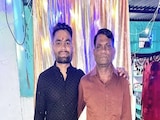- Blood is openly sold in government and private hospitals across Bhopal including AIIMS Bhopal
- Patients must pay bribes or negotiate to access blood units, bypassing medical protocols
- Brokers, ambulance drivers, and hospital staff form an organised network selling blood illegally
In a city where hospitals are built to heal and comfort, NDTV's Operation Blood reveals a disturbing truth - a thriving black market for blood, operating openly across government and private hospitals, cancer centres, and even India's top medical institution, AIIMS Bhopal.
The sting, conducted over several weeks, uncovered how patients are forced into negotiations, backdoor deals, and illegal payments just to access something as basic - and life-saving - as a unit of blood.
The investigation began at Hamidia Hospital, where blood was being sold in the name of "arrangements." No medical prescription, no scrutiny - just cash.
At Jai Prakash Hospital, the transaction began even before entering the premises. In the parking lot, staff and auto drivers were well aware of where blood could be sourced - Red Cross or brokers. One parking attendant said it bluntly: "Inside, they ask for donors. Outside, they ask for money."
Numbers were exchanged. Promises were made. But this wasn't a humanitarian gesture - it was part of an organised, informal network.
At Jawaharlal Nehru Cancer Hospital, where patients battle terminal illnesses, blood was treated not as a necessity but as a commodity. A broker offered O-negative blood for Rs 4,050.
"Donor charge is Rs 3,000, cross-matching Rs 1,050," he said, unapologetically. The deal was ready, and delivery could be arranged at Hamidia, Red Cross, or anywhere else.
At Navodaya Cancer Hospital, which had earlier been linked to suspicious supply chains, the price list was just as clear: "Red Cross will give it for Rs 3,000. Maybe Rs 2,500 if you go direct," one staff member said.
Whether inside the ward or outside the gate, life depended not on blood type but on bargaining skills.
AIIMS, or the All India Institute of Medical Sciences, is often considered the last hope for many patients. But at AIIMS Bhopal, the investigation uncovered a blood market right outside its gates, where brokers, donors, and ambulance drivers operated openly.
At a pan shop nearby, Raj and Vinod, both part of this illicit network, offered blood for Rs 2,000 - Rs 2,500; no questions asked, no ID, no verification.
"Say I'm your uncle. I've done this before," one donor casually said.
Ambulance drivers, meant to save lives, acted as middlemen:
"You'll get it for money. I'll connect you," one driver said before passing on contact details of Bhupendra, a broker who quoted Rs 3,500 per unit.
Outside one of India's most prestigious hospitals, blood was available faster than an ambulance - if you could pay.
If hospitals weren't selling directly, private blood banks across the city were no better - from New Bhopal Blood Bank to Manas and Lifeline, the pattern was the same.
At New Bhopal Blood Bank: "Donor? Not required. Just pay Rs 2,500."
At Manas Blood Bank: "Rs 2,500 if no donor. We can't reduce the rate."
At Lifeline Blood Bank, once the team asked for a discount, the worker, after a quick chat with the owner inside, responded, "Sir said no."
In one case, even when our undercover team pretended to be hepatitis-positive, they were still offered blood - just pay Rs 2,500.
The sting operation found that no patient's name, condition, or emergency mattered. All that mattered was the price. No receipt. No proper donor check. No registration. Just a fixed rate and a whispered transaction.
What was supposed to be a regulated, humanitarian process had turned into a commercial chain, run by guards, drivers, brokers, and unbothered staff.
NDTV's Operation Blood doesn't just expose a few rogue players, but rips the curtain off a systemic, deeply entrenched corruption where human blood, meant to be donated selflessly, is sold like a grocery item.















